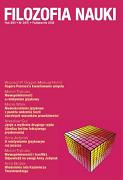Niedookreślenie językowe z punktu widzenia teorii zwrotnych warunków prawdziwości
Linguistic Underdeterminacy from the viewpoint of the Reflexive Truth Conditions Theory
Author(s): Maciej WitekSubject(s): Philosophy
Published by: Uniwersytet Warszawski - Wydział Filozofii i Socjologii, Instytut Filozofii
Keywords: limguistic underdeterminacy; Grice; literalism; contextualism; semantics/pragmatics interface; token-reflexivity
Summary/Abstract: The aim of the paper is to present the theory of reflexive truth conditions with particular reference to the literalist account of communicative competence it offers. Like contextualist conceptions, the theory allows for the phenomenon of linguistic underdeterminacy. Unlike most popular accounts of communicative competence, however, it takes the phenomenon to be a property of the semantic, rather than the cognitive correlate of an utterance; it is claimed, namely, that the semantic correlate of an utterance is to be identified with the state of affairs the utterance signifies, whereas its cognitive correlate is best understood as the conventionally determined, token-reflexive description of the signified state. The paper consists of four parts. In the first section the author offers a few terminological conventions. The second section provides a synthetic presentation of the dominant view on the nature and causes of linguistic underdeterminacy. In the third section, following Manuel García- Carpintero, John Perry and Kepa Korta, the author develops his own version of the reflexive truth conditions theory and points out that the resulting conception offers an original account of linguistic underdeterminacy. The paper ends with general conclusions regarding the nature of linguistic underdetermination and the structure of the literalism/contextualism debate.
Journal: Filozofia Nauki
- Issue Year: 17/2009
- Issue No: 3 (67)
- Page Range: 57-97
- Page Count: 41
- Language: Polish

